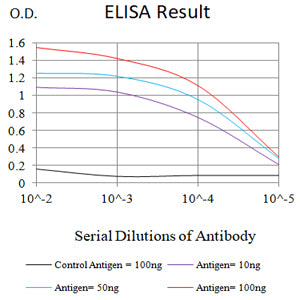
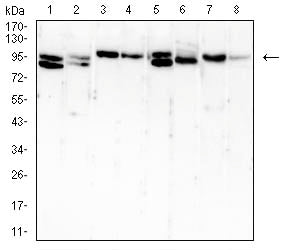
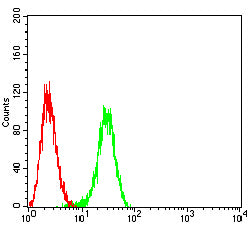
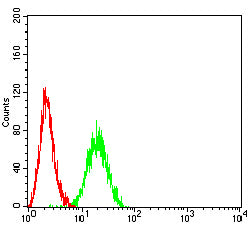
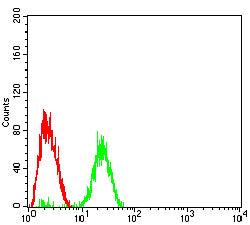
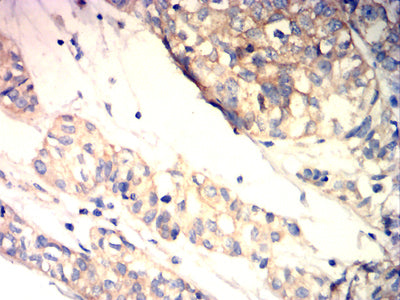
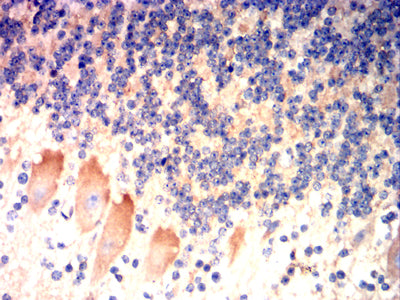
| WB | 1/500 - 1/2000 | Human, Mouse, Monkey |
| IF | 咨询技术 | Human, Mouse, Monkey |
| IHC | 1/200 - 1/1000 | Human, Mouse, Monkey |
| ICC | 技术咨询 | Human, Mouse, Monkey |
| FCM | 1/200 - 1/400 | Human, Mouse, Monkey |
| Elisa | 1/10000 | Human, Mouse, Monkey |
| Aliases | NS7; B-raf; BRAF1; RAFB1; B-RAF1 |
| Entrez GeneID | 673 |
| clone | 3B8B12 |
| WB Predicted band size | 84.4kda |
| Host/Isotype | Mouse IgG1 |
| Antibody Type | Primary antibody |
| Storage | Store at 4°C short term. Aliquot and store at -20°C long term. Avoid freeze/thaw cycles. |
| Species Reactivity | Human, Mouse, Monkey |
| Immunogen | Purified recombinant fragment of human BRAF (AA: 299-447) expressed in HEK293-6e. |
| Formulation | Purified antibody in PBS with 0.05% sodium azide |
+ +
以下是关于BRAF抗体的3篇代表性文献及其摘要概括:
---
1. **文献名称**:*Assessment of BRAF V600E mutation status by immunohistochemistry with a mutation-specific monoclonal antibody*
**作者**:Capper D, et al.
**期刊**:Modern Pathology, 2011.
**摘要**:该研究验证了BRAF V600E突变特异性单克隆抗体(VE1)在免疫组化(IHC)中的应用,证明其与分子检测(如测序)结果高度一致,可作为快速、经济高效的替代方法用于黑色素瘤、结直肠癌等肿瘤的突变筛查。
---
2. **文献名称**:*BRAF V600E mutation-specific antibody: A review of its applications in the diagnosis of metastatic melanoma and other malignancies*
**作者**:Ritterhouse LL, et al.
**期刊**:American Journal of Surgical Pathology, 2013.
**摘要**:研究评估了VE1抗体在多种恶性肿瘤(包括甲状腺癌、肺癌、胶质瘤等)中的特异性与敏感性,证实其在福尔马林固定石蜡包埋组织中的可靠性,为临床病理诊断提供标准化流程。
---
3. **文献名称**:*Comparison of immunohistochemistry and molecular assays for detection of BRAF V600E mutations in colorectal cancer*
**作者**:Sasaki Y, et al.
**期刊**:Clinical Cancer Research, 2016.
**摘要**:通过对比IHC(使用VE1抗体)与PCR/测序在结直肠癌中的BRAF V600E检测效能,研究发现IHC灵敏度达97%,提示其可作为分子检测的有效补充,尤其适用于资源有限的环境。
---
**扩展推荐**:
若需综述类文献,可参考:
4. **文献名称**:*RAF signaling in the BRAF-mutant cancers*
**作者**:Poulikakos PI, Rosen N.
**期刊**:Cancer Discovery, 2014.
**摘要**:系统综述了BRAF突变在肿瘤发生中的作用,涵盖分子机制、靶向治疗及检测方法(如抗体在突变筛查中的应用),为研究BRAF通路提供全面视角。
---
以上文献均聚焦BRAF抗体的临床应用与方法学验证,适用于癌症诊断与分子分型研究。
**Background of BRAF Antibodies**
BRAF antibodies are essential tools in molecular biology and oncology for detecting the BRAF protein, a serine/threonine kinase encoded by the *BRAF* gene. This gene plays a critical role in the MAPK/ERK signaling pathway, regulating cell growth, proliferation, and differentiation. Mutations in *BRAF*, particularly the V600E substitution (accounting for ~90% of cases), lead to constitutive kinase activation, driving uncontrolled cell division and cancer progression. Such mutations are prevalent in melanoma, colorectal cancer, thyroid cancer, and others.
BRAF-specific antibodies are designed to target wild-type or mutant isoforms (e.g., V600E/K) and are widely used in techniques like immunohistochemistry (IHC), Western blotting, and ELISA. They aid in diagnosing mutation-bearing tumors, predicting therapeutic responses, and monitoring disease progression. Clinically, BRAF mutation status guides treatment with BRAF inhibitors (e.g., vemurafenib, dabrafenib) or combination therapies (e.g., BRAF/MEK inhibitors).
However, challenges persist, including antibody specificity, cross-reactivity, and variability in assay protocols. Validation using mutation-confirmed samples and complementary methods (e.g., PCR) is critical. Despite limitations, BRAF antibodies remain pivotal in research and companion diagnostics, shaping precision oncology strategies for BRAF-driven cancers.
×